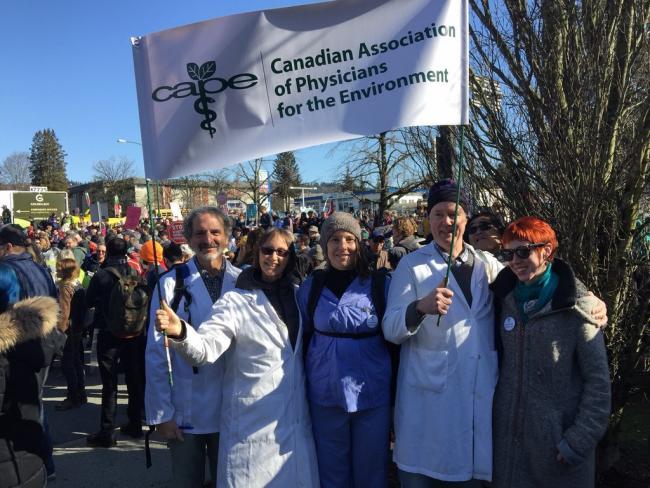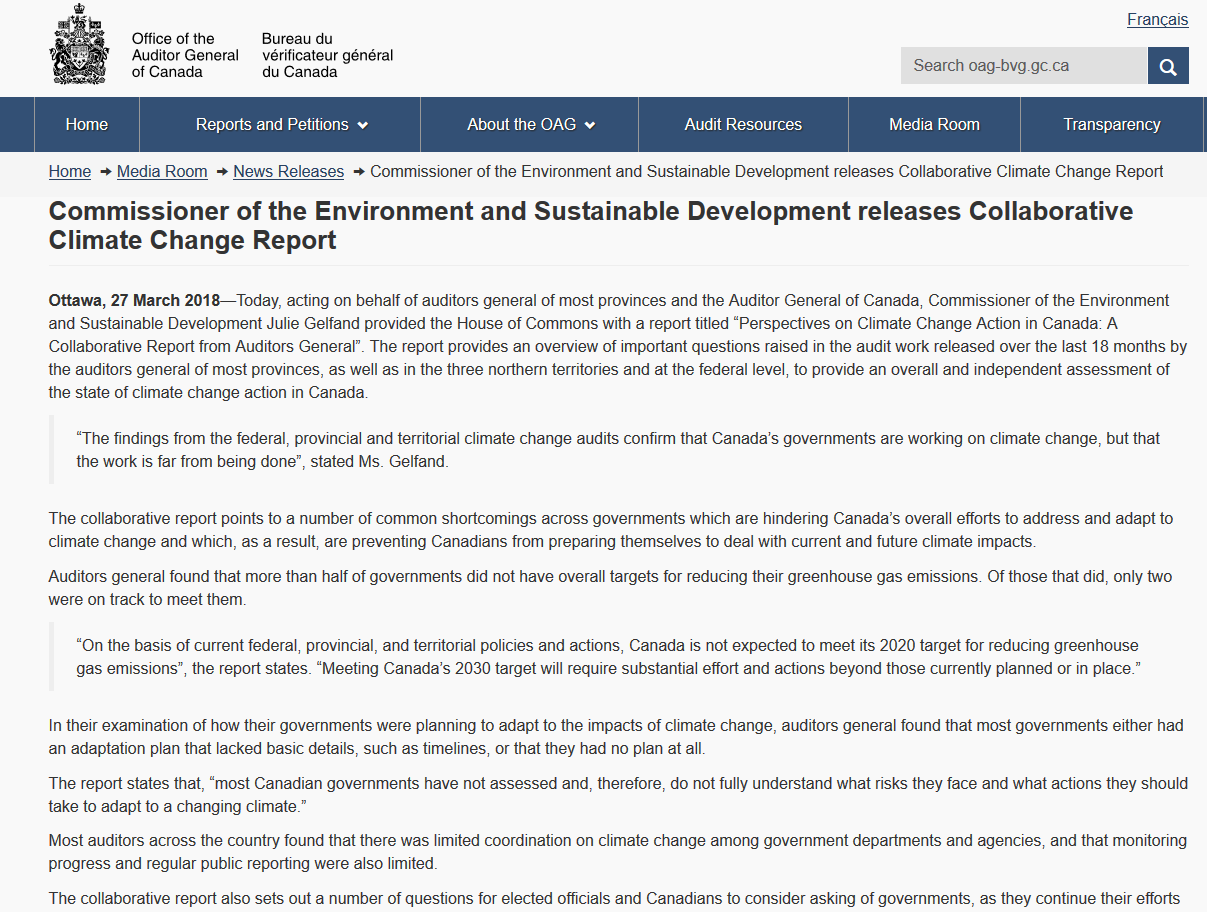Articles Menu

August 20th 2018
As one of the three founders of the Canadian Association of Physicians for the Environment, I have a keen interest in preventing environmental degradation, because I know that human health —my over-riding professional focus — is entirely dependent on healthy ecosystems.
As a physician, I have not personally been arrested on Burnaby Mountain – yet – for protesting the expansion of the Kinder Morgan Trans Mountain pipeline expansion. But I understand why over 200 other people have since March, and why some doctors were risking arrest this morning while protesting the Kinder Morgan oil pipeline and tanker expansion.
As one of the three founders of the Canadian Association of Physicians for the Environment, I have a keen interest in preventing environmental degradation, because I know that human health depends on on healthy ecosystems. #climatechange
As this province, once again, struggles under the burden of hundreds of forest fires and other extreme weather events closely linked to the advancing effects of human-caused climate change, the impetus to engage in civil disobedience grows stronger.
You have, to date, convicted every individual presenting to his court charged with Criminal Contempt of Court (an offence that, despite its name, does not create a criminal record) if corroborative evidence from the RCMP is available and presented by lawyers for the Crown. The penalties for conviction, drawing on precedents established during the legal system’s response to ClayoquotSound protests in 1993 and subsequent situations, have been steadily escalating.
These now include heavy fines, extensive community hours, and increasing jail terms. Last week, you sentenced seven women, six of whom were in their late sixties and mid-seventies, to serve time in prison.
You have, so far, largely dismissed eloquent statements from scientists, health professionals, well-informed seniors and others — many of whom have never before before resorted to civil disobedience — as irrelevant. Crown lawyers continue to fall back on the narrowest of interpretations of the relevant law, while provincial and federal governments by and large sit passively aside, paralyzed by vested interests.
I am fully aware that, to a great extent, you are a prisoner of the letter of the law. You summarized this situation succinctly in your comments reported in the Burnaby Now on April 16, 2018, when you said the trials would be focused on "whether there was notice of the injunction followed by a deliberate, public disobedience of it" and that “the question of whether the pipeline is a good or bad idea is not relevant.”
Your role, as I understand it, at least in part, is that of “trier of fact.” I, by contrast, am a primary care physician in a small B.C. town. I see people based on no other criterion than that they are suffering or distressed in some fashion – by illness, injury or simply worry. In my practice, I work to address the whole person, and hence I must inevitably address the world they live in, because the their surroundings may play a role in their suffering or ill health.
Your decisions around the protesters could be interpreted as willfully blind to an essential reality of our time. But you've seen this kind of situation before. In 2005, as a lawyer, you argued on behalf of Imperial Tobacco that public officials should not be allowed to ask for reparation from the tobacco industry for injury caused by its products. You argued this case all the way to the Supreme Court of Canada, only to see that public officials, in a changed world, were granted the right to seek such reparation.
Today, however, it would be hard to find any scientist or health professional or even any adult who would argue that tobacco companies should be so protected.
In fact, nine years before this Supreme Court of Canada case, one of the individuals you recently sentenced in this court for protesting Kinder Morgan, Mr. Errol Povah, was given an absolute discharge from a charge of mischief after he defaced a billboard advertising Players Pacific cigarettes in 1996. The evidence Mr. Povah presented in his defence, at that time, came from scholars and health scientists; they stated unequivocally that tobacco advertising was designed to cause people to smoke, and that smoking causes severe harm to human health.
Even though I'm not facing you in court, I would like to offer a chain of evidence showing that building the Kinder Morgan pipeline will exacerbate global warming, which will also similarly cause multiple severe harms to human health. And this goes beyond the risk of pipeline leaks, tanker spills, or storage tank explosions, even though these are very serious hazards which the Trans Mountain pipeline expansion might well precipitate.
I’m presenting to you evidence of the role of this pipeline expansion in exacerbating climate change, because climate change is not merely a potential hazard: it is happening right this moment, and will continue at an accelerated pace if this pipeline expansion is built.
My first piece of evidence is that the data affirming global climate change is unequivocal, according to a massive body of consistent research gathered together by the Intergovernmental Panel on Climate Change (IPCC), a United Nations body that has been researching this subject for 30 years. I have included, as a reference, a 2014 document entitled a “Summary for Policymakers” from the IPCC. I here offer three short extracts from this report:



My second piece of evidence is the 2016 report, "Consensus on consensus: a synthesis of consensus estimates on human-caused global warming," by Michigan Technological University, showing that the overwhelming majority of climate scientists agree that the planet's climate has been altered by human activity. In fact, any sense of confusion or skepticism about this objective fact is, today, almost entirely propagated and even funded by the fossil fuel industry; independent scientists with advanced expertise on climate science agree that climate change is being caused by human activity.

It is worth noting that industrialized nations such as the United States, Canada and the countries of Western Europe bear most of the responsibility for the historical production of greenhouse gases.
My third piece of evidence is that Canadian government officials — despite using admirable rhetoric when exhorting others to act to reduce carbon emissions — have themselves performed very badly with respect to such a reduction. I submit a document, prepared by scientists at the Climate Action Network and a German nonprofit called Germanwatch, titled the Climate Change Performance Index.


From this document, I have copied a graph, also submitted in evidence, which displays Canada’s abysmal role in realistically addressing climate change. You will note that Canada (see closeup) is ranked 51 out of 60 nations assessed, with only countries such as Russia, Malaysia, Iran, Kazakhstan and Saudi Arabia – and our troubled neighbor to the south – rated lower.
The Canadian federal Environment Commissioner, Julie Gelfand, working in the office of the Auditor General for Canada, issued her annual report on March 27, 2018. In a press release that accompanied this report -- which is my fourth piece of evidence -- she stated (emphasis mine):
“Canada is not expected to meet its 2020 target for reducing greenhouse gas emissions. Meeting Canada’s 2030 target will require substantial effort and actions beyond those currently planned or in place.” She said further that “most governments either had an adaptation plan that lacked basic details, such as timelines, or that they had no plan at all.”

My fifth piece of evidence is the acknowledgement, among scientists and regulators, that the largest source of greenhouse gases arises from the burning of fossil fuels, as confirmed by a document, entitled “Sources of Greenhouse Gas Emissions,” published by the US Environmental Protection Agency, using data from the IPCC.
Lastly, a widely acknowledged fact is that the “bitumen” or “tar” extracted from the Alberta tar sands and similar deposits is among the most greenhouse gas-intensive fossil fuels. A 2013 article from Scientific American, a respected US science journal, explains why this is so.
As I believe you know, the Kinder Morgan Trans Mountain pipeline expansion is meant to bring bitumen from the tar sands to tidewater, so that its extraction can keep going for decades to come. The authors of this piece observe that if the proven reserves in Alberta’s tar sands were burned, our country’s contribution to climate change would exceed the limit Canada needs to keep global warming below 2°C, the temperature at which catastrophic changes in the planet's climate become inevitable.
It would be naïve to assume that the effects of climate change on human health will be modest or easily manageable.
Harms and massive disruption caused by extreme weather events are today being observed all over the planet, including in this country and in this province and this very city, in which smoke and particulate matter from forest fires surrounds your courtroom.
Based on extensive research evidence in the scientific and health literature, let me enumerate the following harms – many of which have also been documented at length in the popular media:
This global crisis known as climate change will affect not just some unfortunate or misguided people, nor simply this or that region or province or country, or even continent. It will affect the entire planet and all its living things. Climate change will not simply cause hardship and suffering and impairment of health and well-being, or even deaths. It will impair the very life support systems upon which all of us are utterly dependent.
In a very recent article commenting on the recent heat wave in Britain and Europe, climate scientists have stated emphatically that the link between human-caused climate change and such extreme weather events is scientifically “unambiguous” and “inescapable.”
Prominent futurist Buckminster Fuller called our planetary home “Spaceship Earth,” and an elementary knowledge of astronomy confirms that this is an apt description. To damage the operating systems of this “spaceship,” so that future generations find it barely habitable, is unconscionable.
Given the real world context I have just outlined, I must tell you that I feel compelled, as a knowledgeable health professional, to take whatever steps I can to limit the extraction of fossil fuels from the tar sands. Those who protest Kinder Morgan's expansion know what is at stake. We cannot act as if the harms visited on people in other parts of the world are irrelevant to our professional role, because one way or another, those harms will also affect us and those around us – either indirectly, or directly, when extreme weather events damage the community where we live.
Whether you and I choose to acknowledge it or not, we are intimately conjoined by the fact that a threat of global dimension, with profound, clearly measurable and highly predictable harmful outcomes, has been laid out starkly before us by some of the best and brightest minds in our human community.
The impact of this threat now depends entirely on our individual and collective conduct over the next few years. And if you and I fail to act responsibly, then the harshest burdens of our failure will be borne not by you and me, because we’ll be dead in a decade or two. They will be borne by those who are young today, and by many more not yet born.
As the courtroom drama over the Kinder Morgan protests plays out, the world heads relentlessly towards a two-degree Celsius rise in global average temperatures, with attendant and escalating adverse effects on human and ecosystem health. We must break this fatal deadlock.
[Top photo: Photo of CAPE physicians protesting Kinder Morgan pipeline expansion from Facebook]